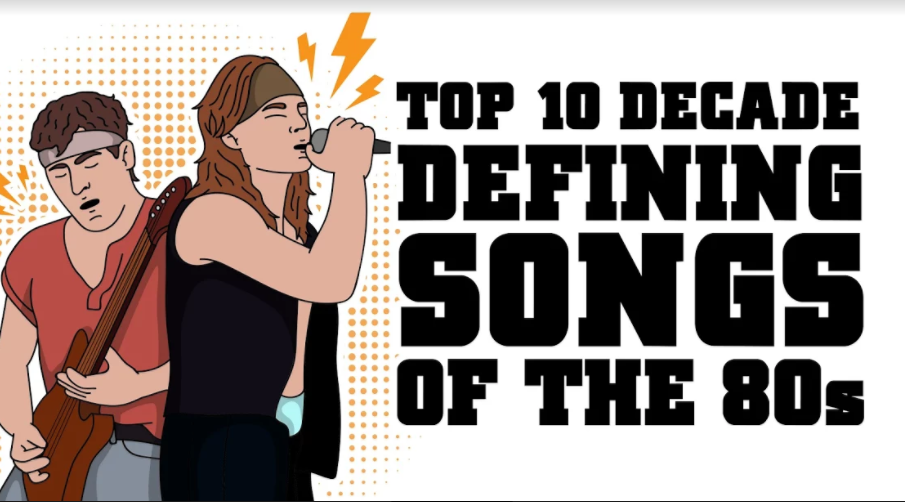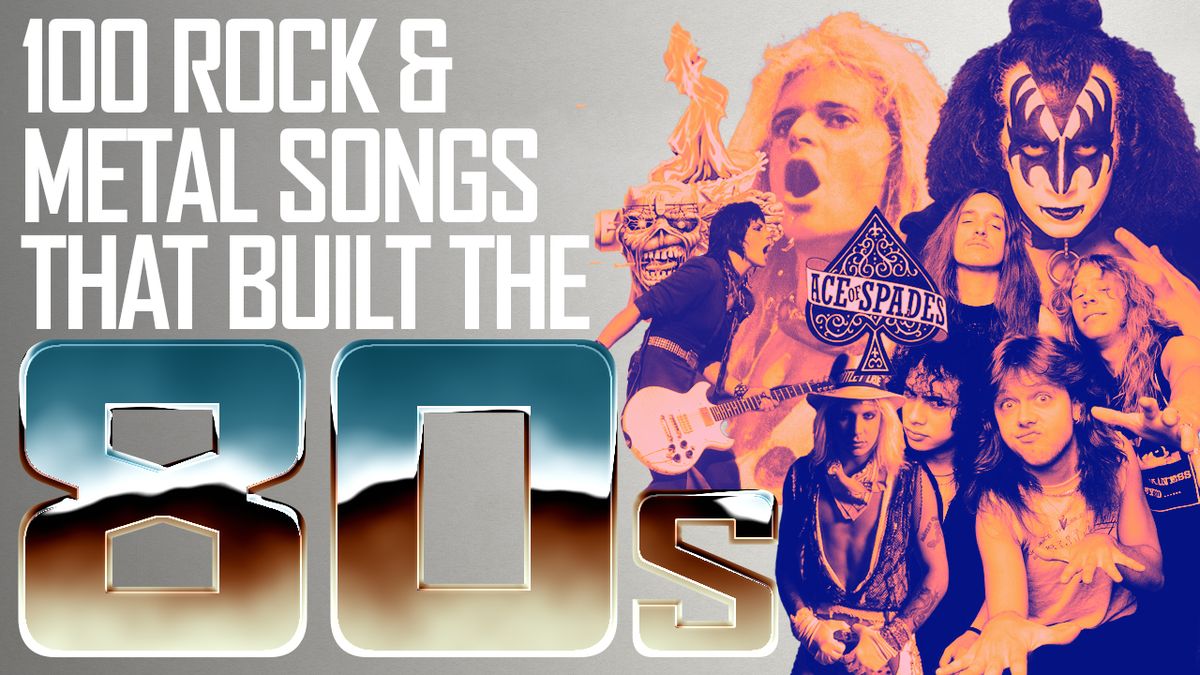The 80s Rock Revolution: A Decades-Defining Sound
Related Articles: The 80s Rock Revolution: A Decades-Defining Sound
Introduction
With great pleasure, we will explore the intriguing topic related to The 80s Rock Revolution: A Decades-Defining Sound. Let’s weave interesting information and offer fresh perspectives to the readers.
Table of Content
The 80s Rock Revolution: A Decades-Defining Sound

The 1980s witnessed a seismic shift in the landscape of rock music, ushering in a decade of unparalleled innovation, experimentation, and cultural influence. While the foundations of rock and roll had been laid in the 50s and 60s, the 80s saw the genre evolve and diversify, embracing a multitude of subgenres and styles, each with its own distinct sonic identity.
This era saw the rise of heavy metal titans, the explosion of synth-pop, and the emergence of alternative rock, all while the traditional rock bands continued to push boundaries and redefine the genre. This multifaceted approach to rock music resonated with a global audience, shaping the musical tastes of a generation and leaving an enduring legacy on the musical landscape.
The Rise of Heavy Metal:
The 1980s marked the peak of heavy metal’s popularity, with bands like Iron Maiden, Judas Priest, Motörhead, Def Leppard, and Metallica dominating the charts and influencing countless musicians. These bands, characterized by their powerful vocals, distorted guitars, and often aggressive lyrics, captured the spirit of rebellion and defiance that resonated with a generation grappling with social and political anxieties.
Iron Maiden, with their complex song structures, theatrical performances, and iconic mascot Eddie, became synonymous with heavy metal’s technical prowess and theatrical flair. Judas Priest, known for their leather-clad image and anthemic songs like "Breaking the Law," pushed the boundaries of heavy metal with their innovative use of double bass drums and soaring vocals. Motörhead, led by the charismatic Lemmy Kilmister, brought a raw and uncompromising energy to the genre, their music characterized by its relentless speed and punk-inspired aggression.
Def Leppard, while firmly rooted in the heavy metal tradition, blended elements of pop sensibility into their music, achieving mainstream success with their album "Pyromania" and its hit singles "Photograph" and "Pour Some Sugar on Me." Metallica, hailing from the burgeoning thrash metal scene, brought a raw energy and technical mastery to the forefront, their album "Master of Puppets" becoming a cornerstone of the genre.
The Synth-Pop Explosion:
The 80s also witnessed the emergence of synth-pop, a genre that blended the electronic sounds of synthesizers with the melodic structure and lyrical themes of pop music. Bands like Depeche Mode, Duran Duran, The Cure, and New Order dominated the airwaves with their catchy melodies, danceable rhythms, and introspective lyrics.
Depeche Mode, known for their dark and brooding synth-pop sound, explored themes of faith, sexuality, and technology in their music, influencing countless artists across genres. Duran Duran, with their glamorous image and sophisticated sound, captured the hearts of a generation with their hit singles "Rio" and "Hungry Like the Wolf." The Cure, led by the enigmatic Robert Smith, crafted a unique blend of gothic and synth-pop, their music characterized by its atmospheric soundscapes and introspective lyrics. New Order, formed out of the ashes of Joy Division, brought a more experimental and electronic sound to the genre, their music exploring themes of alienation, technology, and post-industrial society.
The Rise of Alternative Rock:
As the decade progressed, a new wave of alternative rock bands emerged, challenging the status quo of mainstream rock music. Bands like R.E.M., The Smiths, U2, and Red Hot Chili Peppers brought a fresh perspective to rock music, incorporating influences from punk, folk, and experimental music.
R.E.M., with their unique blend of indie rock, pop, and folk, achieved critical acclaim and commercial success with their album "Automatic for the People." The Smiths, led by the lyrical genius of Morrissey, crafted a distinctive sound that blended pop melodies with introspective lyrics that explored themes of social alienation, loneliness, and love. U2, with their anthemic melodies and Bono’s powerful vocals, became a global phenomenon, their music exploring themes of faith, politics, and social justice. Red Hot Chili Peppers, known for their funk-infused rock and energetic performances, brought a unique blend of pop sensibilities and alternative rock influences to the forefront, their music characterized by its infectious grooves and thought-provoking lyrics.
The Legacy of 80s Rock:
The 1980s left an indelible mark on the world of rock music. The decade’s diverse sounds and innovative approaches to music production continue to inspire musicians today, while the cultural impact of these bands remains undeniable. The 80s rock revolution not only redefined the genre but also shaped the musical landscape for generations to come.
FAQs about 80s Rock Bands:
Q: What were the defining characteristics of 80s rock music?
A: The 80s saw a wide range of rock styles, from the heavy metal of Iron Maiden and Metallica to the synth-pop of Depeche Mode and Duran Duran, and the alternative rock of R.E.M. and The Smiths. Key characteristics included:
- Technological advancements: The use of synthesizers, drum machines, and other electronic instruments became increasingly prevalent, shaping the sonic landscape of the decade.
- Visual aesthetics: Bands embraced flamboyant costumes, elaborate stage productions, and a distinct visual identity that reflected the era’s cultural trends.
- Lyrical themes: Themes of rebellion, social commentary, personal struggles, and introspection were common in 80s rock lyrics.
Q: What were some of the most influential 80s rock bands?
A: The 80s witnessed the rise of numerous influential bands, including:
- Heavy Metal: Iron Maiden, Judas Priest, Motörhead, Def Leppard, Metallica
- Synth-Pop: Depeche Mode, Duran Duran, The Cure, New Order
- Alternative Rock: R.E.M., The Smiths, U2, Red Hot Chili Peppers
Q: How did 80s rock music influence later generations of musicians?
A: The diverse styles and innovative approaches of 80s rock bands have had a lasting impact on music. For example:
- Heavy metal: The technical proficiency and theatrical elements of bands like Iron Maiden and Judas Priest influenced countless metal bands that followed.
- Synth-pop: The electronic sounds and melodic structures of Depeche Mode and Duran Duran paved the way for electronic dance music and synth-pop artists of later generations.
- Alternative rock: The raw energy and introspective lyrics of bands like R.E.M. and The Smiths inspired countless alternative rock bands that emerged in the 90s and beyond.
Tips for Exploring 80s Rock Music:
- Start with the classics: Explore the iconic albums of bands like Iron Maiden ("Number of the Beast"), Metallica ("Master of Puppets"), Depeche Mode ("Violator"), and R.E.M. ("Automatic for the People").
- Discover subgenres: Delve into the diverse subgenres of 80s rock, including heavy metal, thrash metal, synth-pop, new wave, and alternative rock.
- Explore lesser-known bands: Seek out bands that may not have achieved mainstream success but made significant contributions to the 80s rock scene.
- Watch live performances: Witness the energy and theatricality of 80s rock bands through live performances and concert footage.
Conclusion:
The 1980s rock revolution was a defining moment in the history of rock music, a decade that saw the genre evolve and diversify, embracing a multitude of subgenres and styles. From the heavy metal of Iron Maiden and Metallica to the synth-pop of Depeche Mode and Duran Duran, and the alternative rock of R.E.M. and The Smiths, the 80s saw a surge of creativity and innovation that left an enduring legacy on the musical landscape. The decade’s diverse sounds and innovative approaches continue to inspire musicians today, while the cultural impact of these bands remains undeniable. The 80s rock revolution not only redefined the genre but also shaped the musical tastes of a generation and left an enduring legacy on the world of music.








Closure
Thus, we hope this article has provided valuable insights into The 80s Rock Revolution: A Decades-Defining Sound. We thank you for taking the time to read this article. See you in our next article!